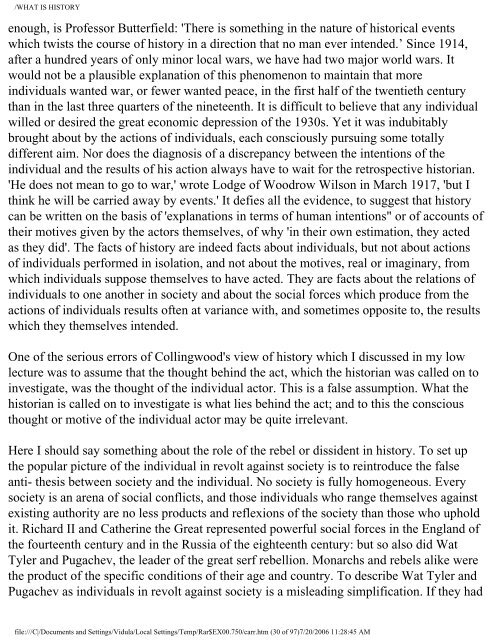What is History / by Edward Hallett Carr - Universal History Library
What is History / by Edward Hallett Carr - Universal History Library
What is History / by Edward Hallett Carr - Universal History Library
Create successful ePaper yourself
Turn your PDF publications into a flip-book with our unique Google optimized e-Paper software.
WHAT IS HISTORY<br />
enough, <strong>is</strong> Professor Butterfield: 'There <strong>is</strong> something in the nature of h<strong>is</strong>torical events<br />
which tw<strong>is</strong>ts the course of h<strong>is</strong>tory in a direction that no man ever intended.’ Since 1914,<br />
after a hundred years of only minor local wars, we have had two major world wars. It<br />
would not be a plausible explanation of th<strong>is</strong> phenomenon to maintain that more<br />
individuals wanted war, or fewer wanted peace, in the first half of the twentieth century<br />
than in the last three quarters of the nineteenth. It <strong>is</strong> difficult to believe that any individual<br />
willed or desired the great economic depression of the 1930s. Yet it was indubitably<br />
brought about <strong>by</strong> the actions of individuals, each consciously pursuing some totally<br />
different aim. Nor does the diagnos<strong>is</strong> of a d<strong>is</strong>crepancy between the intentions of the<br />
individual and the results of h<strong>is</strong> action always have to wait for the retrospective h<strong>is</strong>torian.<br />
'He does not mean to go to war,' wrote Lodge of Woodrow Wilson in March 1917, 'but I<br />
think he will be carried away <strong>by</strong> events.' It defies all the evidence, to suggest that h<strong>is</strong>tory<br />
can be written on the bas<strong>is</strong> of 'explanations in terms of human intentions" or of accounts of<br />
their motives given <strong>by</strong> the actors themselves, of why 'in their own estimation, they acted<br />
as they did'. The facts of h<strong>is</strong>tory are indeed facts about individuals, but not about actions<br />
of individuals performed in <strong>is</strong>olation, and not about the motives, real or imaginary, from<br />
which individuals suppose themselves to have acted. They are facts about the relations of<br />
individuals to one another in society and about the social forces which produce from the<br />
actions of individuals results often at variance with, and sometimes opposite to, the results<br />
which they themselves intended.<br />
One of the serious errors of Collingwood's view of h<strong>is</strong>tory which I d<strong>is</strong>cussed in my low<br />
lecture was to assume that the thought behind the act, which the h<strong>is</strong>torian was called on to<br />
investigate, was the thought of the individual actor. Th<strong>is</strong> <strong>is</strong> a false assumption. <strong>What</strong> the<br />
h<strong>is</strong>torian <strong>is</strong> called on to investigate <strong>is</strong> what lies behind the act; and to th<strong>is</strong> the conscious<br />
thought or motive of the individual actor may be quite irrelevant.<br />
Here I should say something about the role of the rebel or d<strong>is</strong>sident in h<strong>is</strong>tory. To set up<br />
the popular picture of the individual in revolt against society <strong>is</strong> to reintroduce the false<br />
anti- thes<strong>is</strong> between society and the individual. No society <strong>is</strong> fully homogeneous. Every<br />
society <strong>is</strong> an arena of social conflicts, and those individuals who range themselves against<br />
ex<strong>is</strong>ting authority are no less products and reflexions of the society than those who uphold<br />
it. Richard II and Catherine the Great represented powerful social forces in the England of<br />
the fourteenth century and in the Russia of the eighteenth century: but so also did Wat<br />
Tyler and Pugachev, the leader of the great serf rebellion. Monarchs and rebels alike were<br />
the product of the specific conditions of their age and country. To describe Wat Tyler and<br />
Pugachev as individuals in revolt against society <strong>is</strong> a m<strong>is</strong>leading simplification. If they had<br />
file:///C|/Documents and Settings/Vidula/Local Settings/Temp/Rar$EX00.750/carr.htm (30 of 97)7/20/2006 11:28:45 AM







